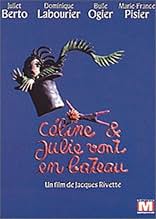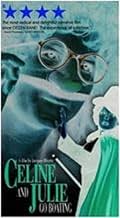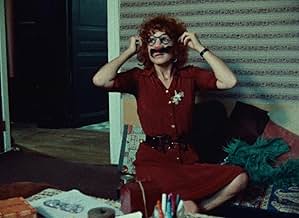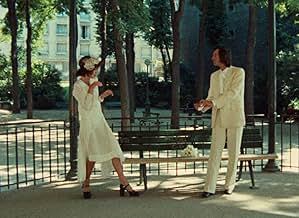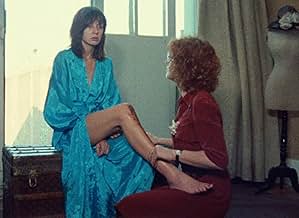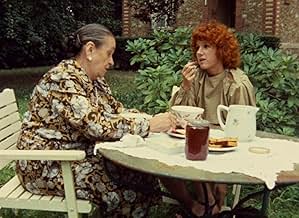Céline et Julie vont en bateau
Titre original : Céline et Julie vont en bateau : Phantom Ladies Over Paris
- 1974
- Tous publics
- 3h 13min
NOTE IMDb
7,2/10
6,8 k
MA NOTE
Un couple de jeunes femmes mystérieusement liées voit leur quotidien préempté par un étrange mélodrame boudoir qui se déroule dans une réalité parallèle hallucinatoire.Un couple de jeunes femmes mystérieusement liées voit leur quotidien préempté par un étrange mélodrame boudoir qui se déroule dans une réalité parallèle hallucinatoire.Un couple de jeunes femmes mystérieusement liées voit leur quotidien préempté par un étrange mélodrame boudoir qui se déroule dans une réalité parallèle hallucinatoire.
- Réalisation
- Scénario
- Casting principal
- Récompenses
- 1 victoire au total
Jean-Claude Biette
- Spectateur au cabaret
- (non crédité)
Jacques Bontemps
- Lecteur à la bibliothèque
- (non crédité)
Michel Caen
- Spectateur au cabaret
- (non crédité)
Avis à la une
Last year, at a crisis time of imminent homelessness, I went to the video store with the idea of renting some banal new release to distract me from my troubles. Waiting in line holding a video starring Tom Hanks (or was it Kevin Costner? Maybe it was Julia Roberts. Such a blur is Hollywood today) something in the foreign section an aisle down caught my eye. It was the video for Jacques Rivette's 1974 masterpiece, Celine and Julie Go Boating.
Immediately upon seeing the cover image of Juliet Berto (Celine) posed as a magician, her Dietrich hauteur kinky and comical, I knew it would be my kind of film. I was also pleased to see it was such a long film it had to be contained in a two-video set. It had long been my suspicion that all secrets of life would be revealed in a film over three hours long and in French.
Indeed, Celine and Julie is just that film. But it conceals as it reveals, which is to say that its great mysteriousness results from its floribundance of revelation. Yes, my friend, a floribundance! I never even thought of such a word until seeing Celine and Julie.
Critics have been unable to explain what it's "about". I cannot. I can't explain the plays of Shakespeare or the poems of Emily Dickinson, but I am moved by them. Attempts to understand them can lead to intense mental spasmodics, but the pain, if the work is good, can be great.
Those who've seen the film will remember the hard magic candy the women savored on their own path to understanding. Vision giving, the candy became an addiction to them. Once is never enough and hasn't been for me. I have seen Celine and Julie three times and thought of it many more.
My favorite scene is where Celine performs her weird magic act in a nightclub where, as far as I can tell, the customers are all convicted poets. The atmosphere there is fascinating. Time stops while she does her act, which is beyond words, indescribable. The whole feeling in that scene of a kind of super sophisticated moment of comedy and sex and mystery all shared by a group of people in silence is one that I find marvelously inspiring. Surely some clever entrepreneur in San Francisco, where I reside, could open such a club. Oh, I suppose it won't happen, but at least one can dream.
Really, it's the importance, power and pleasure-pain of dreaming that this film reawakended me to when I saw it months ago. To be like Celine and Julie with their minds moved by candy is a state I aspire to daily.
When I was briefly without a place to live, I thought of this film and was taken to a sunny day in Montmarte, a house where the living and unliving mingle, a library where stalkers and smokers meet. I savored that magic, the effect of great art on the mind, and I knew I was not truly homeless.
Immediately upon seeing the cover image of Juliet Berto (Celine) posed as a magician, her Dietrich hauteur kinky and comical, I knew it would be my kind of film. I was also pleased to see it was such a long film it had to be contained in a two-video set. It had long been my suspicion that all secrets of life would be revealed in a film over three hours long and in French.
Indeed, Celine and Julie is just that film. But it conceals as it reveals, which is to say that its great mysteriousness results from its floribundance of revelation. Yes, my friend, a floribundance! I never even thought of such a word until seeing Celine and Julie.
Critics have been unable to explain what it's "about". I cannot. I can't explain the plays of Shakespeare or the poems of Emily Dickinson, but I am moved by them. Attempts to understand them can lead to intense mental spasmodics, but the pain, if the work is good, can be great.
Those who've seen the film will remember the hard magic candy the women savored on their own path to understanding. Vision giving, the candy became an addiction to them. Once is never enough and hasn't been for me. I have seen Celine and Julie three times and thought of it many more.
My favorite scene is where Celine performs her weird magic act in a nightclub where, as far as I can tell, the customers are all convicted poets. The atmosphere there is fascinating. Time stops while she does her act, which is beyond words, indescribable. The whole feeling in that scene of a kind of super sophisticated moment of comedy and sex and mystery all shared by a group of people in silence is one that I find marvelously inspiring. Surely some clever entrepreneur in San Francisco, where I reside, could open such a club. Oh, I suppose it won't happen, but at least one can dream.
Really, it's the importance, power and pleasure-pain of dreaming that this film reawakended me to when I saw it months ago. To be like Celine and Julie with their minds moved by candy is a state I aspire to daily.
When I was briefly without a place to live, I thought of this film and was taken to a sunny day in Montmarte, a house where the living and unliving mingle, a library where stalkers and smokers meet. I savored that magic, the effect of great art on the mind, and I knew I was not truly homeless.
Overlong and difficult to watch with the interesting themes and material stretched surprisingly thin
Julie is a quiet and quite shy librarian who is in the park reading her book when a sort of white rabbit runs by in a hurry dropping stuff as she goes. Julie follows the girl to return her glasses etc but loses her, only for the girl (Celine) to turn up at Julie's workplace and put their two lives together. Julie discovers that Celine has been visiting a mysterious house during the day but leaving without a memory of what happened to her in there, so she decides to visit it as well only for the same to happen to her. The pair try to remember what they have gone through and gradually piece together that the house is trapped in a ghostly loop of the day a young girl was killed.
This plot summary is perhaps a bit flattering to the film because it does suggest that this is a tight little mystery with an element of magic and the supernatural to it, however nothing could really be further from the truth. As others have said this film is not really so much about what it seems, but few reviewers here have been able to shed much light on what it is actually about, with the majority just gushing about what a wonderful experience it is. I do concede that watching the film is an experience because it is very different from a lot of stuff I have seen before, but that does not necessarily read that it is brilliant as a result. I know there are things here that I am missing and I'm sure I'm being a total philistine, but it does seem that some people (particularly those who can barely stretch their love of the film to longer than a few lines of text) seem to be falling over themselves to praise a French art film for being, well, French and arty.
It was difficult for me to get through, I'll be honest, because it is very long by anyone standards. The first hour seems to be mostly silent and very, very little happens. Later in the film we do get more into the mystery of the house but even this is stretched to the point where it is hard to really care. Rivette has directed with a nice hand, using edits and atmosphere to produce a sense of wonder where really there isn't one. It does seem like his way of letting his cast explore has helped produce some of this natural air of imagination but I did wish that someone had maybe suggested to him that he reign it in to some degree but I guess nobody did (although seeing some of his other work, maybe this is him in total control!). The overall theme of childhood and imagination within this Alice in Wonderland rip is OK to discuss and think about but it is nowhere near interesting or clever enough to justify the long running time given to it here.
The cast do well to improvise and both Berto and Labourier have bought into the material well, producing the imaginative wonder and lack of restraint that the material needed it never seems like they are questioning anything they are presented with, which is pretty important with all the crossing of identities etc. Outside of them though there really isn't anyone else as the "ghosts" are mostly quite stagy and unconvincing.
Overall then an interesting film on paper but a frantically difficult one in reality. I'm sure many viewers will fall for its meandering scenes and imaginative subtexts but for me personally I found myself "getting it" quite quickly but then still forced to watch the scenes as they drag on. Call me a philistine if you wish, but I didn't really see what all the fuss was about and didn't find the heart of the film to reach me as it appears to have done with other viewers. Have a go by all means but please see it for yourselves and don't let the critical hype tell you what you "should" see.
This plot summary is perhaps a bit flattering to the film because it does suggest that this is a tight little mystery with an element of magic and the supernatural to it, however nothing could really be further from the truth. As others have said this film is not really so much about what it seems, but few reviewers here have been able to shed much light on what it is actually about, with the majority just gushing about what a wonderful experience it is. I do concede that watching the film is an experience because it is very different from a lot of stuff I have seen before, but that does not necessarily read that it is brilliant as a result. I know there are things here that I am missing and I'm sure I'm being a total philistine, but it does seem that some people (particularly those who can barely stretch their love of the film to longer than a few lines of text) seem to be falling over themselves to praise a French art film for being, well, French and arty.
It was difficult for me to get through, I'll be honest, because it is very long by anyone standards. The first hour seems to be mostly silent and very, very little happens. Later in the film we do get more into the mystery of the house but even this is stretched to the point where it is hard to really care. Rivette has directed with a nice hand, using edits and atmosphere to produce a sense of wonder where really there isn't one. It does seem like his way of letting his cast explore has helped produce some of this natural air of imagination but I did wish that someone had maybe suggested to him that he reign it in to some degree but I guess nobody did (although seeing some of his other work, maybe this is him in total control!). The overall theme of childhood and imagination within this Alice in Wonderland rip is OK to discuss and think about but it is nowhere near interesting or clever enough to justify the long running time given to it here.
The cast do well to improvise and both Berto and Labourier have bought into the material well, producing the imaginative wonder and lack of restraint that the material needed it never seems like they are questioning anything they are presented with, which is pretty important with all the crossing of identities etc. Outside of them though there really isn't anyone else as the "ghosts" are mostly quite stagy and unconvincing.
Overall then an interesting film on paper but a frantically difficult one in reality. I'm sure many viewers will fall for its meandering scenes and imaginative subtexts but for me personally I found myself "getting it" quite quickly but then still forced to watch the scenes as they drag on. Call me a philistine if you wish, but I didn't really see what all the fuss was about and didn't find the heart of the film to reach me as it appears to have done with other viewers. Have a go by all means but please see it for yourselves and don't let the critical hype tell you what you "should" see.
Some directors use less than 2% of their footage in the final cut but Rivette must have used 92% of his to make this - perhaps he used absolutely everything, including, apparently, out-takes. Tedium sometimes has a point, but not here. This is annoying-tedium for every scene seems calculated to test our patience. There's no humour or verve or flair or great lines or classic scenes, not even sad attempts at those things, only a forced drollerie that falls flat in every scene There is endless silly giggling, scenes such as those in the nightclub that are just tiresome to watch, fantasy sequences that are presumably meant to look like a corny TV sitcom, but, lacking any scrap of humour, the point is entirely lost and the actors flounder. The girls try far too hard to be cute, and only succeed in being cloying. And I'm waiting for a director to grasp this simple truth: that giving the actors free rein does not make the action more spontaneous and natural, only more strangulated, more self-conscious, more unnatural and cringe-inducing than if they were following a consistent and meticulous script.
After a while you realise Rivette is just playing silly buggers. Fluffed lines are left in, characters glance inadvertently-deliberately at the camera. Rivette will be saying: 'Regard, c'est un film that is pas un film, we're deliberatement toying avec your illusions'. I'm saying: Vous etes un wankeur.
Why three hours? A Senses of Cinema article is eager to explain: 'The tradition of rigid adherence to the 90 minute to 2-hour time frame, enforced by the laws of free market capitalism, is exploded by Rivette. As a filmmaker, Rivette refuses to confine himself to these arbitrary lengths, or to the even more arbitrary, if unspoken, rules about demands on subject matter and mise-en-scène in films of epic length. Instead, Rivette extends the lengths of his films to a point beyond necessity, where it is understood that the film's length in and of itself is a statement about the system he works in and rebels against.' 3 hours simply to defy (capitalistic??) convention? Wankeur.
The audience are the dupes here - poked fun at for trying to apply reality to what is self-consciously only a film. This is not New Wave. I'm gazetting Rivette as a hanger-on, a copyist. He wants to shoot in the style of Rohmer, but he hasn't got Rohmer's indefinable deftness. He wants to break the rules like Godard but he has not got Godard's indefinable style or charisma. He wants to say something meaningful in an offhand way, like Truffaut, but he hasn't got that indefinable intellect for it. All he can do is try. You can feel him trying. It boils down to a single lame joke that isn't funny and a single idea that isn't clever. Three hours of film-flam, tiresome beyond belief.
After a while you realise Rivette is just playing silly buggers. Fluffed lines are left in, characters glance inadvertently-deliberately at the camera. Rivette will be saying: 'Regard, c'est un film that is pas un film, we're deliberatement toying avec your illusions'. I'm saying: Vous etes un wankeur.
Why three hours? A Senses of Cinema article is eager to explain: 'The tradition of rigid adherence to the 90 minute to 2-hour time frame, enforced by the laws of free market capitalism, is exploded by Rivette. As a filmmaker, Rivette refuses to confine himself to these arbitrary lengths, or to the even more arbitrary, if unspoken, rules about demands on subject matter and mise-en-scène in films of epic length. Instead, Rivette extends the lengths of his films to a point beyond necessity, where it is understood that the film's length in and of itself is a statement about the system he works in and rebels against.' 3 hours simply to defy (capitalistic??) convention? Wankeur.
The audience are the dupes here - poked fun at for trying to apply reality to what is self-consciously only a film. This is not New Wave. I'm gazetting Rivette as a hanger-on, a copyist. He wants to shoot in the style of Rohmer, but he hasn't got Rohmer's indefinable deftness. He wants to break the rules like Godard but he has not got Godard's indefinable style or charisma. He wants to say something meaningful in an offhand way, like Truffaut, but he hasn't got that indefinable intellect for it. All he can do is try. You can feel him trying. It boils down to a single lame joke that isn't funny and a single idea that isn't clever. Three hours of film-flam, tiresome beyond belief.
I recommend people read "Excruciating" (federovsky, 8/30/12) and "Much Ado About Nothing" (Milan, 4/15/2012) if they want to know what they are in store for. "Celine and Julie Go Boating" is difficult, frustrating and over long. However, it is also the kind of film that after seeing it, you wonder what other people have to say about it.
I didn't enjoy it much. Visually, it is not terribly special. The relationship between the two women and the "haunted house" is what keeps us watching, but the scenes come very slowly.
Several people have said it unfolds like a dream. Others have pointed out the lesbian/feminist side to it. Another possibility is that the two women represent two personalities of a schizophrenic nurse who committed an unspeakable crime. That would explain the repetitive cutting between one woman as the nurse and then her counterpart switching in. The two sides of the same madwoman angle possibly explains why the story includes the woman who is a performance amateur subbing for the experienced magician.
Between "Celine" (Juliet Berto) and "Julie" (Dominique Labourier), I think Labourier is the strongest here. Labourier has a lot of charisma; too bad Rivette has her often just laughing directly into the camera.
The characters in the "haunted house" are interesting. Marie-France Pisier is a favorite of mine, and she is very mysterious here.
If the scenes didn't unfold so sluggishly, and if the narrative were tighter, I think it would have been great. Unfortunately, it is too much work to recommend.
I didn't enjoy it much. Visually, it is not terribly special. The relationship between the two women and the "haunted house" is what keeps us watching, but the scenes come very slowly.
Several people have said it unfolds like a dream. Others have pointed out the lesbian/feminist side to it. Another possibility is that the two women represent two personalities of a schizophrenic nurse who committed an unspeakable crime. That would explain the repetitive cutting between one woman as the nurse and then her counterpart switching in. The two sides of the same madwoman angle possibly explains why the story includes the woman who is a performance amateur subbing for the experienced magician.
Between "Celine" (Juliet Berto) and "Julie" (Dominique Labourier), I think Labourier is the strongest here. Labourier has a lot of charisma; too bad Rivette has her often just laughing directly into the camera.
The characters in the "haunted house" are interesting. Marie-France Pisier is a favorite of mine, and she is very mysterious here.
If the scenes didn't unfold so sluggishly, and if the narrative were tighter, I think it would have been great. Unfortunately, it is too much work to recommend.
10Corwin-3
Movies would seem to be the ideal medium for surrealism, yet there are almost no good surrealist movies. There is the venerable "Un Chien Andalou", and there is "Celine et Julie vont en Bateau", and that might well be the lot. "Celine et Julie" has been one of my favorite films since I first saw it in the 1970s, because it is hypnotic, thought-provoking, mysterious, and funny, all at once. Its overall style could be described as magical realism, in which the quotidian life of Paris serves as a mere background for the magical fantasy life of the protagonists, two young women on a psychic journey, which may or may not end in madness ("vont en bateau", which literally means "go boating", is also slang for "go crazy").
The film is made of moments that seem to happen outside of time. In fact, the passage of time, the succession of events in everyday life, becomes an intrusion on the increasingly shared inner life of the two women, and each takes (hilarious) action to prevent those intrusions from continuing. They determine, in effect, that they must return as adults to their childhood in order to change the past. This may sound like a boring Freudian nightmare, but there is no heavy-handed psychologizing in the movie; it is all play, lighthearted yet beautifully composed. The sound-track is particularly effective, almost hyperrealistic, with no background music. The click of heels on pavement, or the motor of a taxi, loom out of the silence as in a dream, which the movie may be, at its heart.
I give this one a 10. You probably know already whether you would like it. If so, see it in a theater if you can, and on video if you must, but don't miss it.
The film is made of moments that seem to happen outside of time. In fact, the passage of time, the succession of events in everyday life, becomes an intrusion on the increasingly shared inner life of the two women, and each takes (hilarious) action to prevent those intrusions from continuing. They determine, in effect, that they must return as adults to their childhood in order to change the past. This may sound like a boring Freudian nightmare, but there is no heavy-handed psychologizing in the movie; it is all play, lighthearted yet beautifully composed. The sound-track is particularly effective, almost hyperrealistic, with no background music. The click of heels on pavement, or the motor of a taxi, loom out of the silence as in a dream, which the movie may be, at its heart.
I give this one a 10. You probably know already whether you would like it. If so, see it in a theater if you can, and on video if you must, but don't miss it.
Le saviez-vous
- AnecdotesIt is a misconception that most of the film was improvised by the actors. Jacques Rivette provided structure but did not let his actors "go wild", instead he let them write. A single scene was improvised, where Celine, played by Julie Berto, brags to her associates about her rich American friend. The rest of the scenes where shot from scripted material, mostly thanks to participating actors. The film is collaboration by several authors, including actors Berto, Labourier, Ogier and Pisier. Rivette's involvement in the writing was to give structure to all the contributions, tightening things up.
- GaffesThe last time Julie receives the cigarette from under the table, it is bigger than it was when her colleague handed it to her.
- ConnexionsFeatured in Berlin Chamissoplatz (1980)
Meilleurs choix
Connectez-vous pour évaluer et suivre la liste de favoris afin de recevoir des recommandations personnalisées
- How long is Celine and Julie Go Boating?Alimenté par Alexa
Détails
Box-office
- Montant brut aux États-Unis et au Canada
- 31 452 $US
- Week-end de sortie aux États-Unis et au Canada
- 5 624 $US
- 6 mai 2012
- Montant brut mondial
- 31 452 $US
- Durée3 heures 13 minutes
- Mixage
- Rapport de forme
- 1.37 : 1
Contribuer à cette page
Suggérer une modification ou ajouter du contenu manquant

Lacune principale
By what name was Céline et Julie vont en bateau (1974) officially released in India in English?
Répondre

